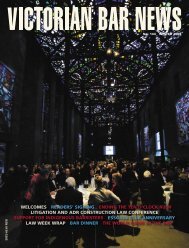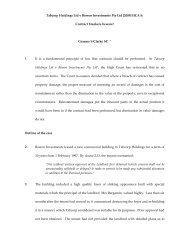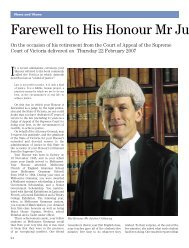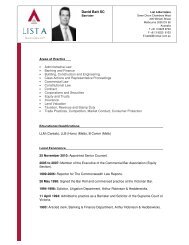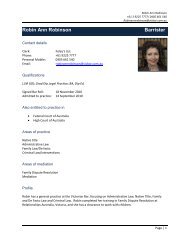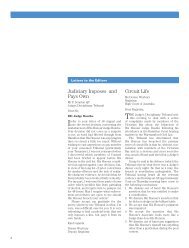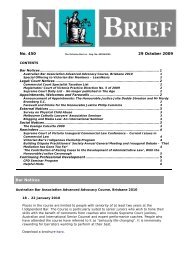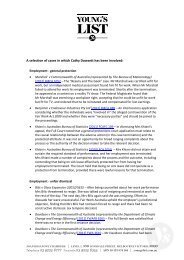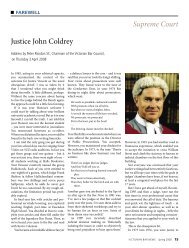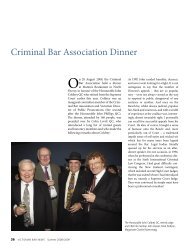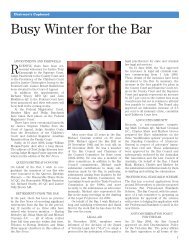Justice William Charles Crockett AO - Victorian Bar
Justice William Charles Crockett AO - Victorian Bar
Justice William Charles Crockett AO - Victorian Bar
- No tags were found...
You also want an ePaper? Increase the reach of your titles
YUMPU automatically turns print PDFs into web optimized ePapers that Google loves.
show that he ought not to have been convictedof anything. It ought to be read, andit has in fact always been read, in the lightof the long tradition of the English criminallaw that every accused person is entitled toa trial in which the relevant law is correctlyexplained to the jury and the rules of procedureand evidence are strictly followed. Ifthere is any failure in any of these respects,and the appellant may thereby have losta chance which was fairly open to himof being acquitted, there is, in the eye ofthe law, a miscarriage of justice. <strong>Justice</strong> hasmiscarried in such cases, because the appellanthas not had what the law says that heshall have, and justice is justice according tolaw. It is for the Crown to make it clear thatthere is no real possibility that justice hasmiscarried. [Emphasis added.]Later cases in the High Court incrementallyadded to and explained thisformulation, but its essence seemed neverto be in doubt. Thus, for example, <strong>Bar</strong>wickCJ in R v Storey (1978) 140 CLR 364 at376 spoke of “a real chance of acquittal”.He expressed the view:If error be present, whether it be by admissionor rejection of evidence, or of law orfact in direction to the jury, there remainsthe question whether none the less theaccused has really through that error orthose errors lost a real chance of acquittal.Put another way, the question remainswhether a jury of reasonable men, properlyinstructed and on such of the material asshould properly be before them, wouldhave failed to convict the accused: or werethe errors such that if they were removed areasonable jury might well have acquitted.[Emphasis added.]It was recognised that there may be circumstanceswhere, even if the jury wouldhave come to the same result despite theimpugned misdirection, the proviso couldnot be applied. Gibbs CJ (with whomStephen and Murphy JJ agreed) observedin Quartermaine v The Queen (1980)143 CLR 595 at 600–601:Ordinarily, when there has been a misdirectionof law, the proviso to s.689 [of the CriminalCode (WA)] will be applied if the Crownestablishes that if there had been no misdirectionthe jury would (or must) have cometo the same conclusion. However, WickhamJ, who delivered the judgment of the Courtof Criminal Appeal in the present case, recognizedthat even if this were established“there might still be a substantial miscarriageof justice if the trial was so irregularthat no proper trial had taken place”, in that“there had been a serious departure fromthe essential requirements of the law”. TheCourt of Criminal Appeal was right in takingthat view of the law ...In Wilde v The Queen (1988) 164 CLR365 at 372–373 this view was said to be“undoubtedly correct”:The question remainswhether a jury ofreasonable men, properlyinstructed and on suchof the material as shouldproperly be before them,would have failed toconvict the accused: orwere the errors such thatif they were removed areasonable jury might wellhave acquitted.[T]he proviso was not intended to provide,in effect, a retrial before the Courtof Criminal Appeal when the proceedingsbefore the primary court have so farmiscarried as hardly to be a trial at all. Itis one thing to apply the proviso to preventthe administration of the criminal law frombeing “plunged into outworn technicality”(the phrase of <strong>Bar</strong>wick CJ in Driscoll vThe Queen (1977) 137 CLR 517 at 527);it is another to uphold a conviction after aproceeding which is fundamentally flawed,merely because the appeal court is of theopinion that on a proper trial the appellantwould inevitably have been convicted. Theproviso has no application where an irregularityhas occurred which is such a departurefrom the essential requirements of thelaw that it goes to the root of the proceedings.If that has occurred, then it can besaid, without considering the effect of theirregularity upon the jury’s verdict, that theaccused has not had a proper trial and thatthere has been a substantial miscarriage ofjustice. Errors of that kind may be so radicalor fundamental that by their very naturethey exclude the application of the proviso... [Emphasis added.]Later still, in Glennon v The Queen(1994) 179 CLR 1 at 8–9, 12–13, the HighCourt held of an impugned misdirectionthat where the misdirection is notfundamental, the appellate court mustbe satisfied that, in the absence of themisdirection, “the jury would inevitablyhave reached the same verdict”. Andin Grey v The Queen (2001) 75 ALJR1708; 184 ALR 593 at [25], Gleeson CJ,Gummow and Callinan JJ made it clearthat, where there has been a departurefrom the requirements of a properlyconducted trial, it cannot be said thatthere has been no substantial miscarriageof justice, unless an appropriately33



